Few performances can rival veteran actor Frank Langella's portrait
of the late President Richard Nixon in the Ron Howard film,
Frost/Nixon. Originally a stage play — based on the actual
interviews conducted by British TV talk show host David Frost in
1977 — the cinematic version fleshes out the rawer theatrical
version with the visual context of the period and a stronger sense
of the social tone of those times. Though the 58 year old actor
looks nothing like Nixon except in the broadest sense, he
brilliantly morphs into the late chief exec down his unique tics and
grunts.
When the real interviews took place, former President Richard Nixon
had recently traumatized the country with his criminal behavior in a
quest for re-election that led to his subsequent resignation in the
face of possible impeachment. Though it seems like a long time ago
for those who did not live through those historical moments, Nixon's
utter disregard for the very rules and laws this country has fought
to uphold led to the Bush regime's equally callous disregard for the
rights and values that we stand for.
So it was both a challenge and a risk that Frost — a legendary
interviewer in England, but one with a more dicey rep in the States
— was willing to take when he approached Nixon's people with his
mega-interview request. Figuring that Frost would lob softball
questions and be something of a push-over, Tricky Dick agreed to do
this one televised interview (especially because he was getting half
a mil for it as well). The interviews took place, were unmitigated
successes and were revelatory — almost as if they were the
prosecutions that never legally took place.
Frost/Nixon
— the play written by Peter Morgan (who also wrote this film
version) — was also a huge success for Langella and won him various
awards and nominations including a Tony for Best Performance by a
Leading Actor in a Play. The former New Jerseyan has won other Tonys
— two for Best Featured Actor in a Play (Edward Albee's "Seascape"
and Ivan Turgenev's "Fortune's Fool") — and was nominated for two
other Best Actor Tonys (first in '78 for the Edward Gorey-designed
Broadway revival of Bram Stoker's "Dracula" and in 2004 for Stephen
Belber's "Match"). Best known for his success in "Dracula," he
starred in John Badham's subsequent film version opposite the late
Sir Laurence Olivier. He has done his share of other films, but his
stage work has made him a force to reckon with.
In light of the waning days of lame-duck President George W. Bush,
this cinematic re-staging of the play offers insights into the
current contentious and troubled presidency. By seeing it mirrored
in Nixon's equally disgraced fall and his subsequent belief that
history will take a kinder view of him, it reveals something about
what's in the mind of the current President and how he feels about
his own failures.
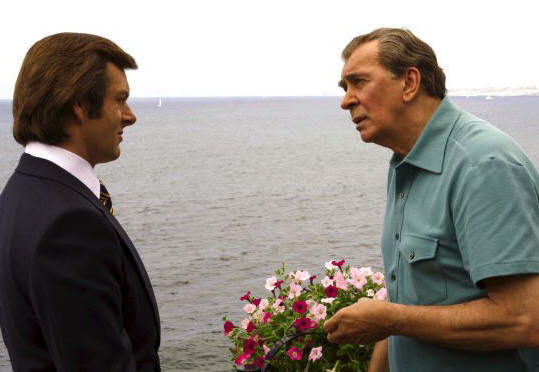 Was
it different playing Richard Nixon in the movie versus playing him
in the theater?
Was
it different playing Richard Nixon in the movie versus playing him
in the theater?
Yes, absolutely. A lot of those things are clichés like "you have to
hit the back row on the stage," and grander gestures — all of that's
true. Then comes the sort of relief of the camera because it is
right here, and you know you can just raise your eyebrow and make an
incredible point that you can't do in the play. So the chief
difference is that you can go more internal in a film, and it's
wonderful. It's quite exhilarating and releasing.
Did you wear more makeup for the movie version of
Frost/Nixon than for the one in the theater?
Yes, but very little. It's so subtle and so small, but it took two
and a half hours to make it look like there's nothing on my face at
all.
Did it take awhile to immerse yourself in being Nixon after you
first got the material?
Oh, it took much longer than just the rehearsal period. It took all
during the eight weeks in the first theater, and the twelve weeks in
the second theater, and then it was Broadway, and then there was the
movie, and I was always peeling that onion; always trying to find
deeper, more profound elements of him.
How did director Ron Howard affect your process of doing the movie?
Ron was about as good as anyone I've ever worked with. He's an
actor's director, someone who truly and completely wants the actor
to shine. He wants the film to be about human beings and wants it to
be about the soul of people. So one of the greatest gifts he gave us
as actors was: take your time, don't feel any obligation to arc a
scene, and play it in the rhythm you played it onstage, or in the
time you played it onstage. [His attitude was]: "Just be the person,
and I'll cut it. I'll come in for the moments we agree are the most
valuable moments." So in that respect, I believe he was the perfect
director for this piece.
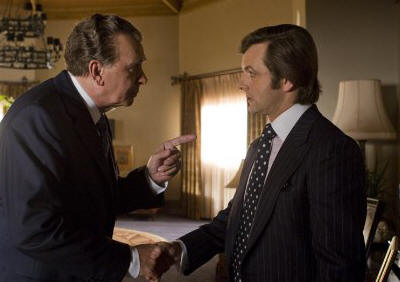 In
an age when fewer and fewer stage actors get to reprise their roles
in the eventual film version, why was it so important that you and
Michael Sheen (Frost) were retained?
In
an age when fewer and fewer stage actors get to reprise their roles
in the eventual film version, why was it so important that you and
Michael Sheen (Frost) were retained?
I can't speak for Michael, but I was very grateful that I was
retained. It's happened to me twice: with Dracula and with
this part. And I don't know if "important" is the right word. I
wouldn't say it is "important," because world hunger's important,
this is just "the movies" and show business. But it is very
heartening to have been asked to do it, because if you've lived with
a character for that long, you'll arguably know him better than any
actor they might choose. And the shorthand on the set with Ron,
Michael and I was incredible, because Michael and I have been
together for eighteen months and we never discussed, "Oh you do
that, I'll do that." We were able to pick up each other's rhythms
after having been in three rehearsal periods, and with three
different casts over a period of eighteen months.
Was it hard going back from being Nixon and returning to being you
again?
No. I always laugh when I read an actor say, "Oh, I did 'Hamlet' and
I couldn't lose the character for two years," and I say, "Well then,
you did it wrong." You should be able to lose the character in a
relatively short amount of time. It is, after all, a skill, and
work. By the time I went out to dinner with friends and stuff, [the
character] was gone. I would say in the movie he hung on longer
because I was with him all day, sixteen hours…
There's a sense of emotion and humor from Nixon in the film that
isn't normally associated with his public persona. Where did that
come from?
I think that I became so protective of him. I became so
compassionate towards him, so that every day I played him I was
always thinking. And I stopped thinking "he" and started thinking
"me." It stopped being Richard Nixon — it became my creation. He
lived with me for such a long time, and I was with him for almost
two years, that it was my reacting to whatever was happening.
[Nixon] got so deep inside me that no matter what Ron threw at me,
like the dog, or a couple of scenes that were totally new, I just
felt, "Oh, this is how he'd behave about money, or a pretty ankle,
or a little funny-looking dog." It became second nature to me.
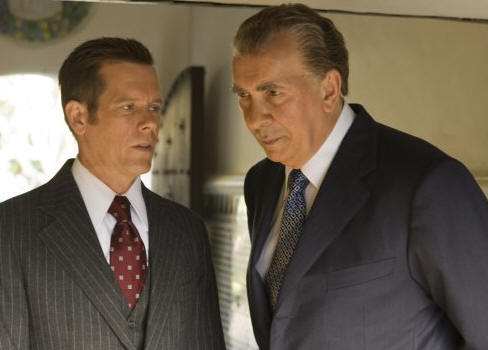 Given
Nixon's insecurities, does it amaze you how successful he became in
reaching the highest office in the land?
Given
Nixon's insecurities, does it amaze you how successful he became in
reaching the highest office in the land?
No, it doesn't amaze me. My philosophy about that is, "If you have
will power and strength, you can overcome. It's actually the people
who have the most to overcome, who usually go the furthest." Some
people pay the price for that, as Nixon did, because they knock
themselves down, because they can't handle what they've achieved.
You'll discover when you talk to really successful people that the
vast majority of them were the runts of the litter. They were the
middle kid, or the funniest-looking one, or the one that everyone
thought would never amount to nothing. I was one of those kids. I
was a four-eyed little kid, and was very shy and backward; and I had
to fight to come up from that. Whenever I wanted to go out with a
girl, she wanted to go out with the football captain — she didn't
want a skinny little guy who wanted to be an actor. I was like,
"What?" So I had a lot to overcome, and the characters I play most
of the time are people who are fighting large-scale, epic problems.
That scene when Nixon makes the midnight telephone call to Frost is
so shocking. Then Frost speaks with Nixon and says, "It was a
pleasure talking to you last night," and Nixon has no recollection
of it. Was that a fabrication or fact?
David [Frost] says no. The phone call didn't happen, that's clear.
The greatest thing about that phone call is [screenwriter] Peter
Morgan's imaginative notion of what it would be like if these two
epic monsters found a way to have a private time together, which
they never did have — that intimate a time together — and what it
would be like, what would Nixon say. Oddly enough, when I first read
the play, I went to Peter and said, "I'm a little concerned about
this phone call. It feels a little editorializing to me and feels
like you making a statement, so I'm not sure how organic I can make
this." Then after a week of performing it, I said, "I'll break both
your legs if you ever cut it!" It's just too good a piece of
theater. It's just too marvelous a scene for an actor to play, and I
came to love the phone call very much.
If Nixon were alive today, what would you say to him?
I've never been asked that question… I would try to embrace him. I
would try to somehow get across to him that, "Living with you for so
long, sir, I feel great compassion for your pain," more than
anything else. The thing that Richard Nixon needed more than
anything else was a kind of deep and profound acceptance that he
never got, probably, from his father. Lots and lots of men suffer
from this. Lots and lots of men spend their lives looking for
surrogate fathers who never gave them a sense of themselves as men,
particularly in the puberty period when you're just coming into your
manhood. That's really when you need your dad there. And I don't
think Nixon ever did.
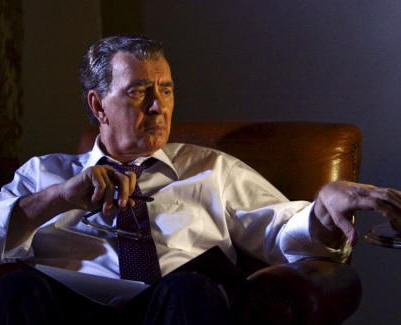 Did
you have that with your father? Or were you missing something like
Nixon was?
Did
you have that with your father? Or were you missing something like
Nixon was?
Yeah; most men do. It's the rare man who says, "Boy, I had a great
dad. He was there for me all the time. We played ball all the time.
He taught me about girls, about sex." Most men will tell you, "I
didn't know what I was doing. I never had anybody help me. I had to
swim my way through and figure it all out." It's a shame. There
really should be a school for parenting.
The movie does make you sympathetic to Nixon, this monster. It
really makes you feel sorry for the bastard.
Well, in one sentence you've called him a monster and a bastard. You
see how totally and completely prejudiced you are?
Well, you said "these two epic monsters."
Well, I meant monster in the larger sense. But that's ingrained in
you to think that way, and you don't have any right to judge him
that way. You're not walking in his shoes. If you think Nixon is a
monster and a bastard, what do you think of the presidents we've had
since? That's the thing: it's very easy to use these words about
this man, and very facile, because we live in a time where it's
sound-byte time. Let's see… Richard Nixon? Monster, bastard. Anna
Nicole Smith? Dumb, blonde. We just do it. We just narrow everybody
down to a tiny little spectrum, and you really can't and you really
shouldn't. I do it too, though, because it's really fast, and it's
really quick. It would've been totally uninteresting of me to play
him as a drunk, or as a crook. Those were two facets of a very, very
complicated man, and we mustn't forget that he was a brilliant
statesman. [Nixon] was an extraordinarily intelligent man. I spent
hours and hours of reading his books. His hopes and dreams for this
country in foreign policy were extraordinary, and what he did in
China and other places was wonderful. It would be a shame to let all
that [go to waste] — history has done it, and he brought it on
himself. Nixon was not destroyed by anything or anyone but himself.
It was surprising how much laughter occurred in viewing the film; it
had a lot to do with the great dynamic and rapport between you and
Michael. How was that established?
We met in July of 2006 during the first day of rehearsal at the Old
Vic. He walked into the room with all that curly hair and a beard,
and he must've thought what I thought: "Gee, this guy doesn't look
like anything like that." He doesn't, and I don't. We had, just as
it does with every actor, probably about a week or two to suss each
other out and get comfortable with each other's styles and rhythms.
We work absolutely differently — completely differently — but at
some point our styles blended, and our sense of each other as actors
became very sharp and keen. For an actor I've spent more time with
than almost any other colleague, we've had fewer discussions about
who was going to do what. We just did it.
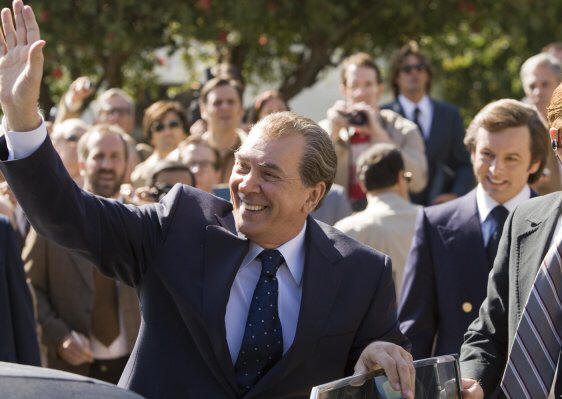 Did
you ever speak with Nixon's family, or any people associated with
his administration?
Did
you ever speak with Nixon's family, or any people associated with
his administration?
I met the Cox family, who came to see the play. Tricia [Nixon's
daughter] didn't come, but her husband, Edward Cox, and children
came. People who worked for Nixon came to see the play and [some]
came backstage. I talked to Frank Gannon [who worked in the Nixon
White House and worked on his memoirs] and had 10 hours of phone
calls all during the time before I left for London. I talked to
Barbara Walters, and to Mike Wallace — anybody who interviewed him I
went to see as well. And someone would come backstage and say, "I
was on his staff during…" this and that. Frequently, people came in
in tears, and it was very rewarding that they would remember their
boss in that sense. They would all come in with a little anecdote:
"He'd like to take everyone to Trader Vic's once a year." And
somebody on the staff said, "Oh God, Nixon would say we're going to
Trader Vic's and we all knew we'd be sitting around, holding drinks
with umbrellas in them, and listening to the boss tell the same
stories he told a year ago!" [Laughs.]
Did you ever speak
to Good Morning America's Diane Sawyer [who had been on Nixon's
staff]?
No. I know Diane socially, but I've never met her related to Nixon.
Apparently, she didn't talk to anybody about it. Nobody got a word
out of her.
Is the film more relevant now given the failings of the Bush
administration?
I don't think this film is a political movie. I think it's a movie
about survival. It's a movie about two men who are trying to
resurrect their careers, trying to outfox each other, and each of
whom is having a particular emotional crisis, and that's universal.
That's in all of us. So I don't think Universal is unaware that this
is a political figure in a very political time, but I think the
movie stands as a movie about two men trying to win.
How do you feel about an Oscar campaign for this film, and in
particular, for your role?
Well, I'm doing what I think I should do, which is part of my job,
which is to help promote the film so people can go and see it. I
don't think any of this has anything to do with somebody checking
your name off. I've been voting at the Oscars for over 30 years and
I've never voted for someone because someone said something
interesting at a press conference, or told a funny joke on Jay Leno:
"Gee, I was caught naked on the balcony of the hotel!" — you know,
all those dumb things that actors say. [Laughs]
Do you feel it should only be what's on the screen?
That's what I vote for. In the end, I watch all the
performances and say, "That's the one that got me." I'm fully aware,
maybe not everybody does that, but it can't be in your mind when
you're doing this. I'm working every night so I haven't been able to
see much, but I will see everything.